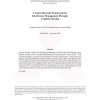Free Online Productivity Tools
i2Speak
i2Symbol
i2OCR
iTex2Img
iWeb2Print
iWeb2Shot
i2Type
iPdf2Split
iPdf2Merge
i2Bopomofo
i2Arabic
i2Style
i2Image
i2PDF
iLatex2Rtf
Sci2ools
108
Voted
ICC
2008
IEEE
2008
IEEE
A Game-Theoretic Framework for Interference Management through Cognitive Sensing
A game theoretic framework is developed in this paper to facilitate inter-cell interference management through cognitive sensing distributively performed by mobile stations (MSs). Using stochastic geometry, we reveal the relationship between the effectiveness of interference management and MS´s ¨willingness¨to perform cognitive sensing. Such cognitive sensing performed by MS is motivated by the associated beneficial results as well as by the rewards from base stations (BS) that encourage sensing. Different tradeoffs for BS and MSs exist in their interactions, which are modeled as a stackelberg game in this paper. While both BS and MS seek to manage interference at its own minimum cost, we design algorithm to achieve nash Equilibrium in such a game and investigate the optimal strategies taken by the players (BS and MSs). ICC 2008 This work may not be copied or reproduced in whole or in part for any commercial purpose. Permission to copy in whole or in part without payment of fee is...
Cognitive Sensing | Communications | Electric Research Laboratories | ICC 2008 | Mitsubishi Electric Research |
Related Content
| Added | 30 May 2010 |
| Updated | 30 May 2010 |
| Type | Conference |
| Year | 2008 |
| Where | ICC |
| Authors | Yingda Chen, Koon Hoo Teo, Shalinee Kishore, Jinyun Zhang |
Comments (0)

